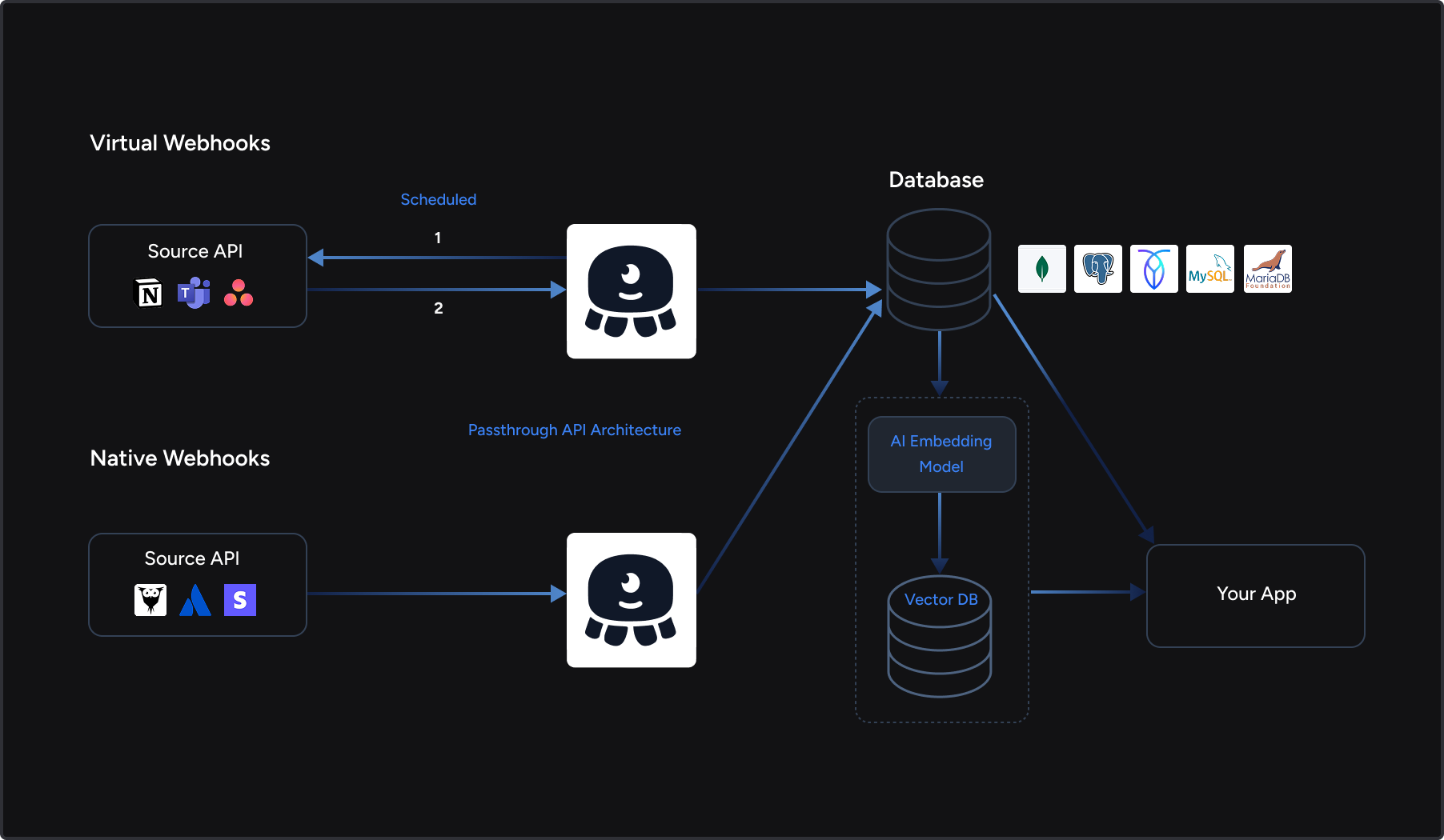Announcing Database Sync: structured, AI-ready data delivered straight to your database
April 2, 2025
Unified.to now supports three flexible methods for accessing your customers' data — giving your team more control over how, where, and when data flows into your applications.
Whether you're building a SaaS platform, AI agent, or analytics engine, you can now choose the method that best fits your architecture:
- Unified API → Retrieve customer data on-demand or poll at set intervals
- Unified Webhooks → Sync historical data and receive real-time updates via Native or Virtual Webhooks directly to your API
- Unified Database Sync (New) → Write structured, AI-ready data directly to your database for high-performance use cases
A new foundation for real-time, AI-first, and analytics-heavy applications

Database Sync builds on Unified.to's real-time unified API infrastructure, offering a direct path from third-party platforms into your database — without custom pipelines or additional infrastructure.
Unified.to's Database Sync:
- Writes normalized data directly to your database
- Supports major relational and non-relational databases: Postgres, MySQL, MongoDB, MSSQL, CockroachDB, and MariaDB
- Powers downstream workflows — from customer-facing dashboards to vector databases and AI agents
Behind the scenes, Unified.to handles the entire pipeline:
- Unified schema mapping across platforms
- Webhook ingestion (native or virtual)
- Scheduled syncs or real-time syncs
- Automatic table creation — we generate database tables based on our unified data models, including sub-tables for arrays and associations
- Ensures your data is always clean and AI-ready
No polling scripts. No ETL overhead. No infrastructure to maintain. Unified.to takes care of the full sync lifecycle — so your team can stay focused on building.
Native vs. virtual webhooks: flexible delivery, same result
Unified.to supports two delivery modes:
- Native webhooks: For platforms that support webhooks, we instantly sync updates to your database.
- Virtual webhooks: For platforms without native support, we virtualize webhooks through scheduled polling — offering near real-time updates with no added infrastructure.
Regardless of the source or delivery method, your database receives structured, normalized records — ready for querying, embedding, and downstream use.
Use cases: power AI-native and data-rich customer experiences
Teams can use Database Sync to build production-grade features that rely on fast, structured access to customer data. Here are some examples:
- AI copilots with real-time customer context
Sync CRM, support, or HR data into a vector database to power retrieval-augmented generation (RAG) agents that deliver relevant, personalized responses. - Embedded analytics and dashboards
Populate in-app dashboards with live data pulled from your customers' tools — without requiring them to manually export or upload anything. - AI-driven recommendations and personalization
Feed unified, structured customer data into your ML models to deliver smarter product experiences — from content suggestions to workflow automations. - Multi-source insights for end users
Aggregate data from disparate third-party platforms into a single view, enabling your product to provide customers with consolidated insights. - SaaS integrations as a product differentiator
Offer rich out-of-the-box integrations that sync directly to your backend — reducing latency, increasing stickiness, and speeding up onboarding.
Database Sync helps you move past the limitations of API polling and fragmented data access — giving your product direct access to your customers' normalized data.
Available now
Database Sync is now available in all Grow and Scale plans, and accessible during your 30-day free trial.
- Databases: Postgres, MongoDB, MySQL, MSSQL, MariaDB, CockroachDB
- AI Workflows: Built-in support for vector DBs and embedding models
- Sync Modes: Scheduled (Virtual) or real-time (Native)
Unified.to is data infrastructure for AI-native products
With Database Sync, Unified.to moves beyond integrations and into infrastructure — giving modern product teams a unified data layer for powering intelligent applications.
AI-native products don't just need API access — they need normalized, unified, and continuously updated data across platforms. Unified.to delivers that with:
- Unification across platforms — abstract away API differences with a consistent schema
- Normalization by default — clean, structured data that's immediately usable
- Multiple delivery modes — query via API, receive real-time events, or sync directly to your database
Whether you're building retrieval-augmented generation (RAG), embedding pipelines, or tools that act on customer data, Unified.to gives you everything you need to move fast — without integration complexity slowing you down.
